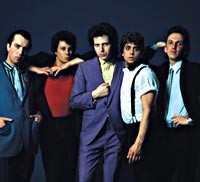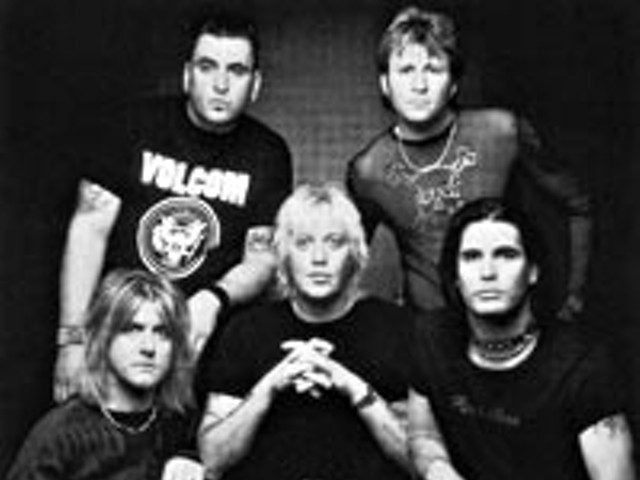Guitarist Robert Gillespie kicks back and pours another vodka, playing the charming host in his sprawling Pleasant Ridge home. It’s a spacious rock ’n’ roll mansion of sorts — guitars, books and records are scattered amid leopard-print rugs and throw pillows. The basement is jammed with musical gear, ready for impromptu drunken jams.
Gillespie has a casual star quality. He plays in the super-group Power Train as well as with Mitch Ryder (since 1983).
Today, however, he’s talking about his “favorite band.” They were called the Torpedos, they were full-on Motown rock ’n’ roll punks, and they debuted in October 1978 at the infamous Bookies 870 club in Detroit.
“Nobody liked us at first,” says Gillespie as he pops in a 1981 video of a Torpedos performance at Harpo’s. He apologizes in advance, saying the tape had no sound. But once it begins playing, it’s obvious that the sound has been mysteriously restored.
Perhaps it’s the work of the spirit of vocalist Johnny Angelos, who is front and center on the video. Angelos, the gangster R&B punk, doesn’t just look out from the screen, he jumps and screams out at you. He sounds cocky and cool and he looks fantastic.
He would be dead in three years.
Seeing and hearing
Detroit’s ’70s punk scene is distinctive for the lack of attention it received. It was as though the music made here wasn’t as significant as, say, New York’s or London’s. That wasn’t the case, but the scene’s insularity just made the Motown experience that much more personal. Bands like the Torpedos grew by word of mouth in small, clammy, beer-drenched clubs. Clubs such as Bookies were Detroit’s version of Gotham’s CBGBs. Unfortunately, other than the Romantics, who were poppy and radio-friendly enough to appeal to labels and radio programmers, Detroit lacked the media coverage or big-label breakouts that should have put the opulent punk scene on the commercial map.
If you wanted to hear the tunes, you had to see a band live. And if you didn’t see them then, you don’t have much chance of hearing their music. The Mutants, the Cadillac Kids, the Ramrods and others recorded little that was ever released, so their work remains largely unknown to new generations of rock ’n’ roll fans. Many of these bands symbolized Detroit’s resonant music history while bringing it up to date in the punk era. And none embodied the Motor City spirit — corrupted and transformed by the punk sound at the time — more than the Torpedos.
Even though the Torpedos released just one single and an EP, both on Brian Williams’ Four Winds Records, which both sold more than 1,000 copies, they left an indelible mark. Thanks to Mike Leshkevich and his homegrown Motor City Music label, the Torpedos can be experienced fresh and new with the release of the band’s first-ever CD, No Refills.
Gillespie and Angelos formed the Torpedos in October 1978, fusing their love of classic Motown soul and blues with elements of Heartbreakers and Sex Pistols punk. Gillespie says the Torpedos stood out from an emerging pack of new bands because “we had killer songs and a excellent front man in Johnny, who was like Rod Stewart, but more deviant.”
He recalls meeting Angelos “in 1969 down on Plum Street at the Red Roach coffee house when I was 14 years old.”
Although the two played separately in various bands (Angelos in the Mighty Quick and the Amboy Dukes; Gillespie in the Rob Tyner Band), the Torpedos brought out their shared vision of rock ’n’ roll with an attitude.
Their fellow Torpedos were drummer Ralph Serafino, bassist Mike Marshall (both Tyner Band alumni) and keyboardist-sax player Tom Curry. All were in their late 20s and comprised, for all intents and purposes, an “east side band,” though Angelos hailed from Dearborn. (Jim Banner’s replacing Marshall in the summer of ’79 was the only lineup change.)
Gillespie loved writing songs with Angelos. “He was really spontaneous; words just flew out of his mouth. He played guitar too; he played some on the EP.”
Angelos’ notorious battle with drugs (“He loved pills of all kinds.”) was never much of an impediment to the band, Gillespie says. He contributed everything from songwriting to the design of the band’s collision-style punk collage fliers.
Love and hate
The Torpedos played in tune, which, Gillespie stresses, distinguished them from so many other punk bands of the era. The band always evoked a response, thanks to Angelos’ unpredictable antics.
“One time we were opening for Humble Pie at the Center Stage in Canton,” Gillespie recalls, “and the crowd just hated us! They threw bottles and just wanted to kill us.”
The Torpedos had equal shares of lovers and haters, but they also had the stellar songs to back up their attitude. The songs rock and provide a perfect backdrop for a night of barroom fun, yet they can also be almost sad — as evidenced by Angelos’ lyrics of “No pills can change it” and the longing for love in “Dreaming.”
Gillespie picks up his gold-top Les Paul and plucks out a pretty, gentle version of “Checkin’ Out.” Melodic Stones grooves meet head-on with a ’70s punk attitude, influenced in part by Johnny Thunders, the former New York Doll who was then a member of the Heartbreakers. Thunders was Angelos’ pal (and inspiration for the Torpedos’ single “Pop Star”).
“We used to play later on with the Heartbreakers at the Red Carpet when they came through,” Gillespie says.
They developed a following, label interest and landed choice shows with the Romantics at venues such as Cleveland’s Agora ballroom and Detroit’s Masonic Temple. They got some radio support from Doug Podell and Steve Kostan. Yet it was not enough.
The Torpedos broke up shortly after Angelos split in 1981. He went on to form the Reputations with guitar slinger Bobby East. The Torpedos tried to continue with Thomas Anonymous, a singer from New York.
“It was just not the same without Johnny, and while I was pissed for a long time with him, we came to peace with one another later on,” Gillespie says. “He last called me just a day before he died and wanted to get together, but I couldn’t — I had a show with Mitch (Ryder).”
Gillispie claims no one saw Angelos’ exit coming, that he didn’t appear depressed or offer signs that he was suicidal. On Nov. 24, 1984, Angelos was found dead in his car from exhaust fumes, in his closed garage, a Philip K. Dick novel at his side. He was 36.
The ex-Torpedos went on to play in assorted Detroit bands. Gillespie gives guitar lessons these days, having taught some of Detroit’s rising stars, including members of the Von Bondies and the Wildbunch.
“You have to give it to bands like the White Stripes,” he says. “They are what’s hot and making Detroit right now.”
Asked what makes the garage sound so popular, he replies, “ Kids can play it.”
Last year’s release of No Refills brought the Torpedos together for what appeared to be a one-off reunion show. With Johnny’s son, Mitchel, at the mic, the crowd jammed into Lili’s 21 were transported back a generation. No Refills goes to great lengths to give the Torpedos the much overdue exposure and justice they deserve. Alongside songs from the band’s EP and single releases, it also includes exciting, bright live recordings of the band in its heyday.
For now it appears that an infrequent show may be all the band plans to do.
Gillespie says he “misses Johnny all the time.” Success in rock ’n’ roll, he says, “is all about the monkey up front.”
Maybe so, but excellent tunes, rock-solid playing and a no-bullshit attitude can never be denied. The Torpedos had it all the way. Visit www.motorcityjams.com for more info.
The next Torpedos reunion show is Saturday, Dec. 28 at Alvin’s (5756 Cass, Detroit), with Virginia and the Monsters, Cocktail Shake and Blamethrowers. Call 313-831-4577 for more information.
Ricky Phillips is a Detroit-area writer and musician. E-mail him at





